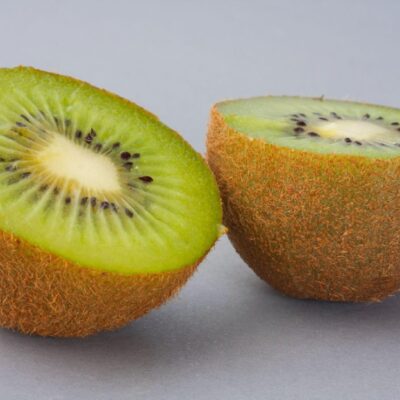Yes, dogs can eat kiwis, but only in moderation. This furry fruit is packed with minerals and vitamins for your furry friend. Kiwi seeds, however, may be slightly toxic to dogs in large quantities. Cut the kiwi into small quantities or remove the seeds before feeding the fruit to your dog.

Safe: This food is generally considered safe by the veterinary community. Dogs can eat this food sometimes or in small amounts but contains little to no nutritional value.
| Food Safety: | Beneficial in moderation |
| Nutritional Value: | Vitamin E, C, and K, folate, potassium, lutein |
| Daily Serving: | 2-3 pieces per day |
| Benefits: | Antioxidant, eye health, overall health |
| Good For: | Adult or Senior Dogs |
Are Kiwis Good For Dogs?
Yes, kiwis are good for dogs since they provide the following nutritional benefits:
- High in lutein, which supports canine eye health1
- Contain vitamins E and C in to support the immune system and overall health
- Contain beta-carotene, which has antioxidant properties2 and may improve your dog’s immune system
- Hydration: kiwis have an 80% water content, with the remaining portion of the fruit packed with nutrients. Kiwis are more nutrient-rich than other dog-safe, hydrating foods like cucumber and can also freshen your dog’s breath. However, eating kiwi is not an alternative to regular canine dental cleaning requirements.
What Size Kiwi Portion Can Dogs Safely Consume?
Cut one small kiwi into pieces to make the fruit easier to eat and digest for the dog. Kiwis should be given to dogs in small quantities because, like apples and other fruits popular with dogs, kiwi seeds contain a very small amount of amygdalin, which releases cyanide into the body when consumed.
Due to their toxicity, you should avoid giving whole kiwi fruits to a small dog like a chihuahua. Larger dogs may be able to digest an entire kiwi but even bigger animals should only eat kiwi as an occasional treat.3
How to Feed Dogs Kiwi
You can give dogs whole kiwi by cutting it up into small pieces. Smaller dogs should be given tiny pieces of kiwi to reduce choking hazards.
When feeding your dog kiwi for the first time, serve small quantities to ensure it doesn’t cause any adverse reactions. While dogs are not typically allergic to kiwi, use caution and watch the animals carefully afterward for signs of distress.
What Happens If Dogs Eat Too Much Kiwi?
Overeating kiwis can upset your dog’s stomach. Dogs may also exhibit the following symptoms if they consume too much kiwi:
- Diarrhea
- Vomiting
- Lethargy
- Lack of appetite
If you notice these symptoms, please contact your vet for an appointment.
Citations
https://wildearth.com/blogs/dog-knowledge/can-dogs-eat-kiwi (2021)
https://www.mountsinai.org/health-library/supplement/beta-carotene#:~:text=Beta%2Dcarotene%20is%20an%20antioxidant,a%20number%20of%20chronic%20illnesses (2008)
https://www.countryliving.com/uk/wildlife/pets/a40928049/can-dogs-eat-kiwi/ (2022)
Frequently Asked Questions
-
No, dogs should not eat kiwi skin. While it is packed with nutrients and vitamins for humans and dogs, kiwi skin is tough, insoluble, and hard to chew, especially for smaller dogs. Therefore, it is a good idea to feed dogs kiwi without the skin.
-
No, dogs should not eat a whole kiwi because it can potentially cause choking if they don’t chew it properly before swallowing. Small breeds may not attempt to eat a whole kiwi, but larger ones will. It is thus a good idea to cut the kiwi into pieces before feeding it to dogs.
-
No, dogs cannot eat kiwi seeds because they can be toxic if consumed in large quantities. Hence, these seeds should be removed before feeding them to dogs.
-
No, dogs are not necessarily allergic to kiwi, but some can be more sensitive or intolerant to it than others. Eating whole kiwi with the skin can cause irritation or swelling in the mouth that can be mistaken for an allergic reaction. If you notice any of these, it is recommended to contact a veterinarian at the earliest.







